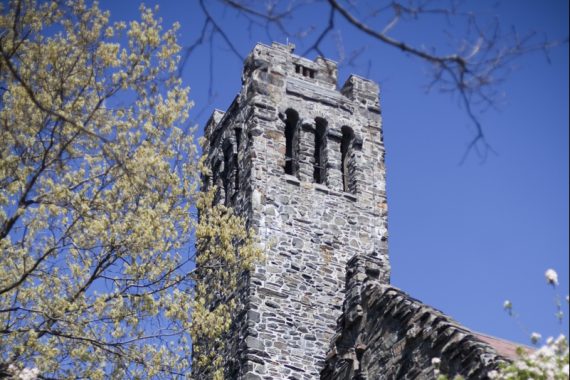Carillon Notes for March 2020
Friday, March, 6th, 2020 Announcements Carillon Tune

Carillon Notes for March 2020
Tune name: Jerusalem (“And did those feet in ancient time”)
Before winter break, Liam Cronan, A20, asked me if we might sing the hymn “Jerusalem” in Protestant Evening Worship during spring semester. To make sure that I had the correct one, I began to sing “and did those feet in ancient time…” and he confirmed that it was indeed what he had in mind. (There is also a hymn that begins “Jerusalem, my happy home” that is sometimes referred to by the same name, hence my clarification). We found an appropriate occasion to sing it, but inconsidering the music I realized that it was well suited to the bronze bells of the carillon, so I offer it as our March tune.
“Jerusalem” is a hymn that can claim to have a truly excellent text. It consists of sixteen lines of poetry taken from the prologue to Milton: A Poem in Two Books, by the great English Romantic poet William Blake (1757–1827); he started writing it in 1804 and published it in 1808. Over a century later, Robert Bridges included the poem in an anthology called The Spirit of Man, a patriotic collection of verse that was assembled to boost morale in 1916, the middle of World War I. In the same year, Bridges asked the composer Charles Hubert Hastings Parry to supply “suitable, simple music… that an audience could take up and join in” to Blake’s text for a meeting of the “Fight for Right” campaign, also intended to boost English morale during the war years. He did so, it was published for the meeting, and met with great success. However, in the next couple of years, Parry began to have doubts about the increasingly ultra-patriotic political views of the group for whom he had written it and he asked them stop using it in 1917. But, when Millcent Fawcett, leader of the National Union of Women’s Suffrage Societies, asked if they might use it for a concert, Parry orchestrated it and it became the Women Voter’s Hymn. When women of England finally gained equal voting right in 1928, Parry’s estate granted the rights to the hymn to the Women’s Institute, a charitable organization in the United Kingdom and some of the commonwealths.
Since its early performances, it has been a very popular hymn in England. It appears in several hymnals published by the Church of England, even though it is more of a national song than a true hymn. (The Oxford English Dictionary’s first definition of hymn is “a religious song or poem of praise to God or a god” though it goes on to be more general down the page: “a song, text, or other composition praising or celebrating someone or something.”) It has a prominent place in one of England’s annual patriotic celebrations at the Last Night of the Proms, where the entire Royal Albert Hall and many parks throughout England erupt into song in a manner not dissimilar to the Boston Pops 4th of July celebrations. Edward Elgar’s ornate orchestration of “Jerusalem” has been used there for many years, having eclipsed Parry’s own simpler orchestration.
Finally, it is also featured in the film Calendar Girls, a Hollywood adaptation of the true story of a Women’s Institute chapter that decided to make a nude calendar of its members in order to raise money for a memorial for one of their husbands, who had died of leukemia. Helen Mirren starred in the film and one of her more memorable lines was about trying to make the Women’s Institute more relevant. “It’s not all jam and ‘Jerusalem,’ you know!” she declared. The campaign, both in the film and in reality was extremely successful and raised over £578,000, enough to not only buy the leather sofa that the women wanted to be a memorial (her husband had always complained about the uncomfortable sofa in the waiting room of the treatment center in the hospital), but also to establish a cancer ward in his name.
Blake’s text, in his own original capitalization and spelling is below, with what we would now write as “England’s” (possessive) spelled “Englands.” Parry changed one word in setting the text; whether it was a mistake or not is sometimes debated. Blake wrote “these dark Satanic Mills” but Parry wrote “those dark Satanic Mills.” While the standard interpretation of the line is that the “Mills” are the fairly new cotton, steel, and flour mills of the Industrial Revolution, others have suggested that it isn’t so simple; perhaps Blake is actually talking about the great Anglican churches like St. Paul’s Cathedral and Westminster Abbey.
And did those feet in ancient time,
Walk upon Englands mountains green:
And was the holy Lamb of God,
On Englands pleasant pastures seen!
And did the Countenance Divine,
Shine forth upon our clouded hills?
And was Jerusalem builded here,
Among these dark Satanic Mills?
Bring me my Bow of burning gold:
Bring me my Arrows of desire:
Bring me my Spear: O clouds unfold:
Bring me my Chariot of fire!
I will not cease from Mental Fight,
Nor shall my Sword sleep in my hand:
Till we have built Jerusalem,
In Englands green & pleasant Land.
Further listening and viewing:
http://youtu.be/lOFHVXE6yWs Jiří Bělohlávek conducts the BBC Symphony Orchestra and Chorus in Elgar’s orchestration at Last Night of the Proms 2012.
http://youtu.be/vyKIjbCKkCE Sir Stephen Cleobury conducts the Choir of King’s College, Cambridge with organ scholar Oliver Brett, 2009.
http://youtu.be/XPGdpzmmXEk Arrangement and performance by Sam Robson, a popular YouTube musician whose arrangements range from simple to over a hundred tracks, all sung by one person.